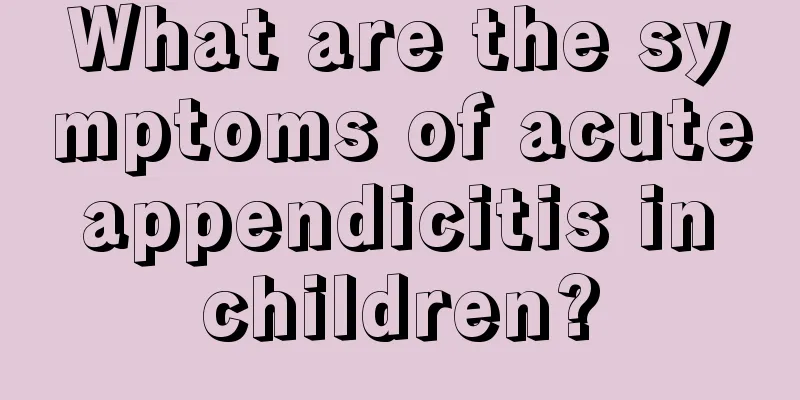What are the symptoms of renal hematuria in children?

|
Everyone knows that when children are young, their various organs and immune capabilities are not as good as those of adults, which is why they are very prone to getting sick. Among them, kidney disease is very common. When kidney disease occurs, hematuria will occur, which has a great impact on the child's body. Many parents are unable to help their children treat their diseases well in the beginning because they don’t know much about it, so let’s learn more about it below. Renal hematuria refers to hematuria originating from the glomeruli. Clinically, it manifests as simple hematuria or hematuria accompanied by proteinuria. It is more common in primary glomerular diseases such as IgA nephropathy, mesangial proliferative glomerulonephritis, focal glomerulosclerosis, renal cysts, and polycystic kidney disease. It can also be seen in secondary glomerular diseases such as purpuric nephritis and lupus nephritis. If the treatment is not thorough, the disease recurs or is misdiagnosed or missed, the condition cannot be effectively controlled and will eventually lead to uremia. The pathogenesis of renal hematuria is currently believed by the medical community to be related to immunity, that is, the antigen-antibody complex is deposited in the glomerular basement membrane and mesangial area, destroying the filtration barrier of the glomerular basement membrane, while causing proliferation of mesangial cells and mesangial matrix, causing renal hematuria. Treatment of renal hematuria in children 1. General treatment During the acute phase, you should rest in bed and gradually increase your activity after the clinical symptoms improve. A low-salt diet (less than 3g per day) should be given during the acute phase. People with normal renal function do not need to limit protein intake, but in cases of azotemia, protein intake should be limited, and high-quality animal protein should be the main source. People with oliguria should limit their fluid intake. 2. Treat the infection focus. 3. Symptomatic treatment Diuretic, swelling-reducing, blood pressure-lowering and prevention of complications. 4. Dialysis treatment When acute renal failure occurs and dialysis is indicated, dialysis treatment should be given promptly. Interstitial Nephritis: 1. General treatment The first step in treating interstitial nephritis is to eliminate the cause, control the infection, promptly stop using the sensitizing drugs, and treat the primary disease. 2. Symptomatic supportive treatment Correct renal anemia, electrolyte, acid-base and volume imbalance, significantly elevated blood creatinine or combined with hyperkalemia, heart failure, pulmonary edema and other blood purification indications. Blood purification treatment should be performed in a timely manner clinically. Continuous blood purification treatment can be used for acute interstitial nephritis. For those who enter the uremia stage, kidney transplantation can be performed if conditions permit. (1) Promoting renal tubular regeneration Cordyceps sinensis can promote the growth of renal tubular epithelial cells, improve the stability of cell membranes, and enhance the tolerance of renal tubular epithelial cells to hypoxia. It has a certain therapeutic effect on tubular interstitial nephritis. (2) Immunosuppressants: Interstitial nephritis mediated by immune factors such as autoimmune diseases and drug allergies can be treated with hormones and immunosuppressants. The above article provides a detailed introduction to the symptoms of renal hematuria in children. I hope this can help some parents, and at the same time remind some parents that if they encounter this situation, they must not be vague, and take their children to the hospital for appropriate examinations in time. If there are any problems, they can be treated in time to prevent the disease from deepening the child’s pain. |
<<: What are the causes of developmental disabilities in children?
>>: How to check for developmental disabilities in children?
Recommend
How to treat hand, foot and mouth disease in children
In fact, hand, foot and mouth disease is a skin d...
How to care for erythrasma in babies
Red ringworm on babies is a headache for many par...
What causes a child to suddenly have a nosebleed?
Some young children suddenly experience nosebleed...
Is it normal for a one and a half year old baby to have thin and yellow hair?
Children are the apple of their parents' eyes...
What to do if your child refuses to go to school
Going to school is the most important activity fo...
How to treat chronic tonsillitis in children
Chronic tonsillitis in children is a common disea...
How to prevent motion sickness in children
With the continuous improvement of people's s...
What to do if your baby is frightened and crying?
Some babies will cry when they are frightened, wh...
How to treat stuttering in children?
When children are just beginning to learn to spea...
My daughter's breasts started to develop at the age of nine.
Breasts are very important organs for women. Not ...
Symptoms of urinary tract infection in little girls
The incidence of urinary tract infection among li...
What should a 5-year-old baby eat to reduce internal heat?
If a five-year-old baby gets angry, you must pay ...
Why does my baby keep shaking his head?
The baby's every move touches the parents'...
Red pimples on baby's face
The skin of babies is very delicate. Many parents...
What is the cause of the blue vein on the baby's nose?
There are many blood vessels and organs in the hu...









